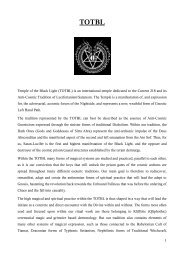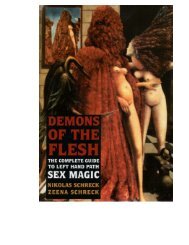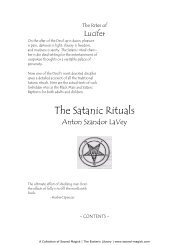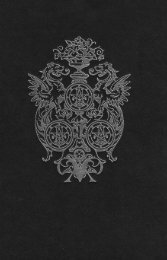Satanism Today - An Encyclopedia of Religion, Folklore and Popular ...
Satanism Today - An Encyclopedia of Religion, Folklore and Popular ...
Satanism Today - An Encyclopedia of Religion, Folklore and Popular ...
You also want an ePaper? Increase the reach of your titles
YUMPU automatically turns print PDFs into web optimized ePapers that Google loves.
Buddhism 33<br />
complex system <strong>of</strong> signs <strong>and</strong> symbols characterizes<br />
the work, rendering the medieval concept <strong>of</strong><br />
the Devil’s omnipresence in human life in every<br />
kind <strong>of</strong> form. The allusion to demonology in<br />
Bosch’s art reflects the common wisdom <strong>of</strong> his<br />
time, when belief in the Devil was fundamental to<br />
proper religious devotion.<br />
See also Demons; Hell <strong>and</strong> Heaven<br />
For Further Reading:<br />
Beagle, Peter S., The Garden <strong>of</strong> Earthly Delights.<br />
London: Pan Books, 1982.<br />
Cavendish, Richard, ed. Man, Myth & Magic. The<br />
Illustrated <strong>Encyclopedia</strong> <strong>of</strong> Mythology, <strong>Religion</strong><br />
<strong>and</strong> the Unknown. 1983. Reprint, New York:<br />
Marshall Cavendish, 1995.<br />
<strong>Encyclopedia</strong> <strong>of</strong> World Art. London: McGraw-Hill,<br />
1960.<br />
Linfert, Carl, Hieronymus Bosch. New York: Harry<br />
N. Abrams, 1989.<br />
The Brotherhood <strong>of</strong> Satan<br />
A diabolical coven takes over a small town in this<br />
1971 film. The elderly Satan worshipers plan to<br />
conduct a ritual for the purpose <strong>of</strong> transferring<br />
themselves into the bodies <strong>of</strong> kidnapped children<br />
<strong>and</strong> continuing their infernal lifestyle into a new<br />
generation.<br />
Brotherhood <strong>of</strong> the Ram<br />
The Brotherhood <strong>of</strong> the Ram, founded by Don<br />
Blythe in the 1960s, was a Satanist organization<br />
that operated in southern California from the<br />
early 1960s into the 1970s. The name Brotherhood<br />
<strong>of</strong> the Ram appears to have been taken from a<br />
fictional Satanist group in Dennis Wheatley’s<br />
novel, The Satanist. The group opened a bookstore<br />
in Los <strong>An</strong>geles, California, which was closed in the<br />
1980s, when the brotherhood disb<strong>and</strong>ed. The<br />
group also ran a disco, “Satan’s A Go-Go.”<br />
Members <strong>of</strong> this group considered Satan a god <strong>of</strong><br />
joy <strong>and</strong> pleasure, <strong>and</strong> accepted such traditional<br />
practices <strong>of</strong> <strong>Satanism</strong> as the “pact,” through which<br />
they renounced all other devotion <strong>and</strong> their<br />
Christian baptism. According to Michael<br />
Newton’s account <strong>of</strong> a brotherhood ritual in<br />
Raising Hell, participants opened their meeting<br />
with a reading <strong>of</strong> Baudelaire’s “Litanies <strong>of</strong> Satan”<br />
<strong>and</strong> an invocation <strong>of</strong> Lucifer before new recruits<br />
“pricked a finger <strong>and</strong> smeared blood on a scrap <strong>of</strong><br />
paper bearing his or her signature.”<br />
See also Baudelaire, Charles ; Wheatley, Dennis<br />
For Further Reading:<br />
Newton, Michael. Raising Hell: <strong>An</strong> <strong>Encyclopedia</strong> <strong>of</strong><br />
Devil Worship <strong>and</strong> Satanic Crime. New York:<br />
Avon, 1993.<br />
Wheatley, Dennis. The Satanist. 1960. London:<br />
Arrow Books, 1974.<br />
The Brothers Karamazov<br />
The Brothers Karamazov (1880) is a classic novel<br />
by the famed Russian author Theodor Dostoevsky<br />
that attempts to come to grips with good <strong>and</strong> evil.<br />
He examines the human situation by focusing on<br />
the complexities <strong>of</strong> the Karamazov family, whose<br />
characters are constantly struggling with the issue<br />
<strong>of</strong> life’s meaning <strong>and</strong> purpose. A priest warns the<br />
brothers that because God is love itself, the real<br />
meaning <strong>of</strong> hell is being unable to give <strong>and</strong> receive<br />
love. The real locus <strong>of</strong> evil is humanity itself—<br />
human greed, avarice, <strong>and</strong> inability to love one<br />
another. Despite all the horrors he experiences,<br />
Ivan, one <strong>of</strong> the brothers, is still able to see beauty<br />
in life <strong>and</strong> choose love, knowing it is greater than<br />
any other power in the world. Those who are not<br />
aware <strong>of</strong> this are the ones damned to hell—a place<br />
to which one does not actually journey, because<br />
hell is located within oneself.<br />
—Evelyn Oliver<br />
Buddhism<br />
Buddhism is a major world religion that was<br />
founded by Siddhartha Gautama in the Indian<br />
subcontinent around 600 B.C.E. Buddhism is<br />
clearly in the same religious family as Buddhism’s<br />
parent religious tradition, Hinduism. However, to<br />
be considered within the Hindu fold, one must<br />
nominally acknowledge the authority <strong>of</strong> the four<br />
Vedas, Hinduism’s most ancient religious texts.<br />
Buddha rejected the authority <strong>of</strong> the Vedas, <strong>and</strong><br />
hence, despite its close relationship with<br />
Hinduism, Buddhism is technically non-Hindu.<br />
Unlike almost all other religions, Buddhism is<br />
not focused on deities. Gods <strong>and</strong> goddesses are
















